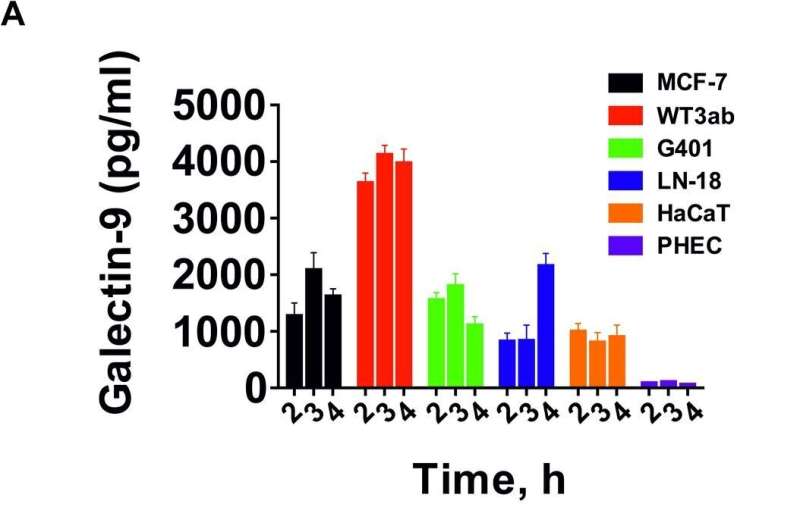T cells induce galectin-9 secretion in human cancer cells derived from solid malignant tumors and keratinocytes. (A) Human cancer cells derived from solid malignant tumors, HaCaT keratinocytes and primary human embryonic cells were cocultured for 16 hours with Jurkat T cells at a ratio of 1:1. Cells were then separated and washed with fresh culture medium followed by culture for 4 hours. Galectin-9 release was measured at 2, 3 and 4 hours. Jurkat T cells did not release detectable amounts of galectin-9. (B) MCF-7 human breast cancer cells were cocultured for 16 hours with Jurkat T cells, TALL-104 or primary CD3-positive human T cells at a ratio of 1:1. The experiment was performed as described in section (A). T cells did not release detectable amounts of galectin-9. As a control we used MCF-7 cells which were not cocultured with T cells. (C) Galectin-9 secretion measured in resting cells studied in section A, which were cultured for 24 hours as outlined in the Materials and methods section. Quantitative data represent mean values±SEM of four independent experiments. Credit: Journal for ImmunoTherapy of Cancer (2023). DOI: 10.1136/jitc-2022-005714
Researchers from the Medway School of Pharmacy (MSOP)—a partnership between the universities of Kent and Greenwich—in collaboration with colleagues from Inselspital (University Hospital of Bern, Switzerland) and the University of Oldenburg (Germany), have made recent discoveries in how the human proteins that fight cancer treatment work.
Galectin-9, a protein found in all mammals, is responsible for regulating human immune responses. It is of particular interest due to its ability to suppress the anticancer activities of T-cells—a type of white blood cell that is part of the immune system and can be used to help fight cancer. As such, galectin-9 is used by cancer cells to escape immune surveillance.
Tackling the ability of Galectin-9 to nullify the effectiveness of T-cells and other anti-cancer activities of treatments—or at least a further understanding of how this happens—could help make more cancers curable.
Previous research has shown that galectin-9 is highly expressed in a large number of human cancers including very aggressive tumors such as glioblastomas—an aggressive type of cancer with less than 10% 5-year survival rate, that can occur in the brain or spinal cord—and more common cancers like breast and lung. However, solid tumor cells at rest are known to secrete either very low amounts of galectin-9 or, in most of the cases, do not secrete it at all.
The team set out to clarify whether T cells can induce galectin-9 secretion in human cancer cells derived from solid malignant tumors and whether this soluble form displays higher systemic immunosuppressive activity compared with the cell surface-based protein.
This research shows, for the first time, that T-cells induce galectin-9 secretion in various types of human cancer cells derived from solid malignant tumors via differential biochemical mechanisms. The findings underline a crucial role of galectin-9 in anticancer immune evasion and highlight the need for further investigation into galectin-9 and its regulatory pathways in order to develop new and efficient treatment for a large number of cancers—including those which are currently often incurable.
Dr. Vadim Sumbayev, leader of research consortium which conducted the study and Director of Research in MSoP, said, "These results not only confirm what we already knew about this cancer-treatment fighting protein, but also help us better understand it's functions and how it works with other types of tumors."
"Understanding Galectin-9 and the whole anti-cancer immune evasion machinery would allow us to map these pathways and rapidly identify them in each individual patient by using simple biochemical marker tests and make existing, or new treatments, more effective."
"Furthermore, this knowledge would allow us to identify the best therapeutic targets on a personalized basis and design highly efficient drugs to interact with them in the desired way. As a result, for each cancer patient, we will be able to rapidly adapt a highly efficient and affordable personalized targeted immunotherapy. And this will significantly improve both survival rates and quality of life of cancer patients during and after treatment. While there is still a long way to go, this brings us a step closer to developing life-saving cancer treatments."
The work is published in the Journal for ImmunoTherapy of Cancer.
More information: Stephanie Schlichtner et al, T lymphocytes induce human cancer cells derived from solid malignant tumors to secrete galectin-9 which facilitates immunosuppression in cooperation with other immune checkpoint proteins, Journal for ImmunoTherapy of Cancer (2023). DOI: 10.1136/jitc-2022-005714
Provided by University of Kent
























